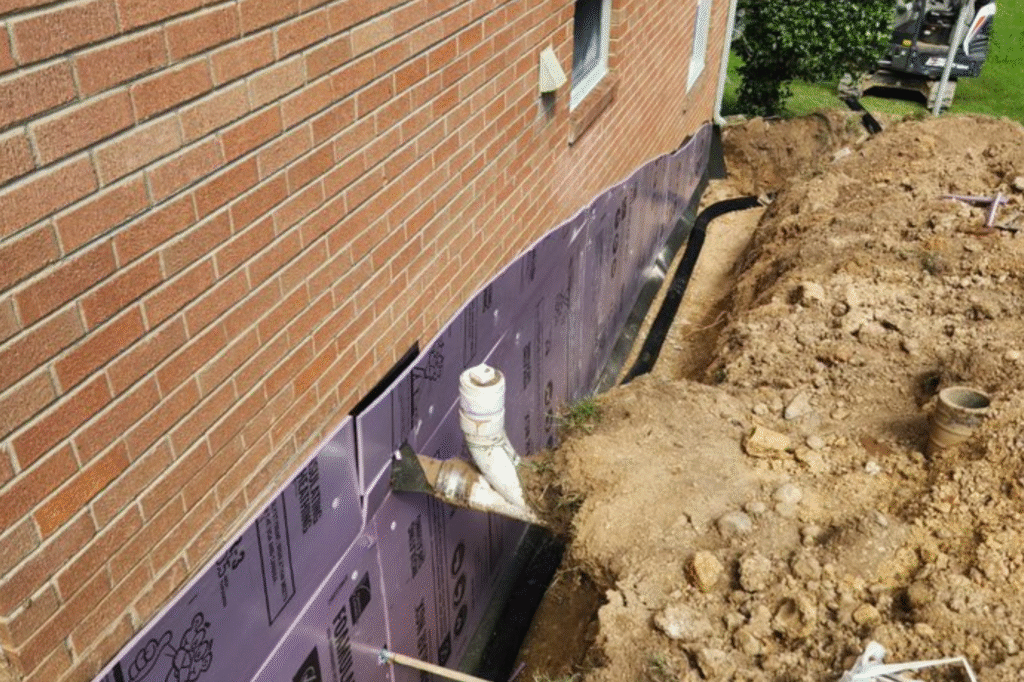To stop water in your basement quickly, start by identifying the root cause. Check for foundation cracks, poor drainage, and improper landscaping. Verify that downspouts extend six feet from your home and that the ground slopes away. Use quick fixes, such as polyurethane injection for cracks and waterproof caulking around windows. Install a sump pump to handle water that enters, and operate a dehumidifier to manage moisture levels. Regularly maintain gutters and downspouts and inspect for new damage. If these efforts do not fully resolve the issue, reaching out to a trusted basement waterproofing contractor Richmond could be a prudent step. Discover more about comprehensive Richmond basement waterproofing solutions and preventive strategies.
Key Takeaways
- Seal foundation cracks quickly with polyurethane or epoxy injection kits to prevent water intrusion.
- Ensure gutters and downspouts are clear and extend at least six feet from the house to prevent water pooling.
- Use a dehumidifier to control basement humidity and deter mold growth.
- Install sump pumps to remove water entering the basement during storms efficiently.
- Consider basement waterproofing services for comprehensive solutions and structural assessments.
Understanding Water Intrusion
When it comes to managing water intrusion in your basement, understanding its origins is crucial for effective prevention and mitigation. Water seeps into basements through several primary pathways, each requiring a targeted solution.
Cracks in foundation walls are a common entry point, allowing rainwater to infiltrate during storms. Addressing these cracks quickly with sealants or structural repairs can greatly reduce water intrusion.
Poor drainage systems also contribute to basement water issues. When gutters are clogged or downspouts are inadequate, water is directed toward your foundation, increasing the risk of seepage. Regular maintenance of these systems ensures that water is effectively diverted away from your home.
A high water table poses another challenge, where groundwater pressure forces water into your basement. In such cases, installing sump pumps or interior drainage systems can effectively manage the influx of water.
Improper landscaping exacerbates water intrusion by directing rainwater toward your house. Confirming proper grading, where the soil slopes away from the foundation, is a critical preventive measure.
Identifying Basement Problem Areas
Understanding the common pathways of water intrusion sets the stage for pinpointing specific areas of basement problems. Start by examining your foundation walls for visible cracks. These are notorious entry points for water, especially during heavy rains. Use a flashlight to inspect dark corners and behind any stored items, as cracks can be difficult to spot.
Next, evaluate the efficiency of your drainage system. Check for clogged gutters and downspouts that might be directing water toward your foundation instead of away from it. Make sure downspouts extend at least six feet from the house. If they are not, consider extending the diversion to divert water further.
Also, investigate the slope of the surrounding landscape. The ground should incline away from your home, not toward it. Improper grading can lead to water pooling against the foundation, increasing the likelihood of seepage.
Lastly, consider the impact of a high water table. If groundwater pressure is significant, it might push water into your basement. Look for signs like damp walls or floors.
Identifying these problem areas is essential for effective Richmond basement waterproofing and maintaining your basement’s integrity. Address these issues promptly to safeguard your home.
Quick Fixes for Leaks
Sometimes, leaks in your basement can appear unexpectedly, but quick fixes are available to tackle these nuisances efficiently.
First, identify the leak source. If it is a crack in the foundation, using a polyurethane or epoxy injection kit can temporarily seal it. These kits expand to fill gaps, effectively preventing water ingress.
If water is seeping through joints or around windows, apply a waterproof caulk specifically designed for masonry or concrete. This creates a barrier against further leaks.
To manage immediate water accumulation, consider using a wet/dry vacuum. It is a practical tool for quickly removing standing water, thereby minimizing potential water damage. Ensure the vacuum is equipped with a fine filter to handle water effectively.
For persistent moisture issues, a dehumidifier can be a game-changer. By reducing air humidity, you prevent mold growth and further water damage. However, remember to check and empty the water collection tray regularly to maintain efficiency.
Lastly, inspect and clear your gutters and downspouts. Ensure they direct water away from your foundation, mitigating future leak risks.
These quick fixes are essential steps in maintaining a dry, leak-free basement environment.

Comprehensive Waterproofing Solutions
With a well-executed approach, extensive basement waterproofing services effectively shield your basement from water infiltration, ensuring long-lasting protection.
You will need to consider both interior and exterior methods for optimal results. Interior waterproofing involves sealants and coatings applied to walls and floors, which prevent moisture from entering your space. Additionally, installing a sump pump is vital for removing any water that does find its way in. These devices work continuously to pump water out, keeping your basement dry.
For exterior waterproofing, excavation around your foundation is necessary. This allows you to apply waterproof membranes that act as a barrier against water. To complement this, install French drains along the foundation’s perimeter. These drains reroute water away from your home, reducing pressure on your foundation.
Also, verify your property’s grading slopes away from your house, promoting proper water flow and preventing pooling around the structure.
Combining these strategies will create a thorough defense system against water intrusion. By addressing potential weak points and employing proven solutions, you will safeguard your basement from damage, mold, and structural issues.
Trust in these methods for a drier, healthier home environment.
Preventative Measures and Maintenance
After implementing thorough waterproofing solutions, it is essential to focus on ongoing preventive measures and maintenance to ensure long-term effectiveness.
Start by verifying your gutters and downspouts are regularly cleaned and in good repair. Clogged gutters can lead to water overflow, directing it toward your foundation. Ensure that downspouts extend at least five feet away from your home to prevent water from pooling near the basement walls.
Inspect your foundation walls periodically for any new cracks that may appear. Seal them promptly using high-quality epoxy or polyurethane sealants. This prevents water from seeping through and causing damage.
If your basement has a sump pump, test it regularly to ensure it is functioning properly. Pour water into the sump pit to verify that the pump activates and effectively removes water. Consider installing a battery backup system to keep it operational during power outages.
Proper landscaping is essential. Verify the soil around your home slopes away from the foundation at a gradient of one inch per foot for at least ten feet. This prevents water from collecting near your walls.
Regularly check for signs of water damage or mold inside your basement. Addressing these issues swiftly helps maintain a dry and healthy environment.
Choosing Professional Help
How do you determine when it’s time to hire a professional for Richmond basement waterproofing? Begin by evaluating the severity and source of your water issues. If you have noticed repeated water intrusion despite DIY efforts, it is time to consult an expert.
Professionals possess the technical expertise to diagnose complex problems, like high water tables or extensive foundation cracks, which might be beyond your skill set.
Professional services may initially seem like a larger investment, but they can prevent costly repairs in the future. A trusted basement waterproofing contractor in Richmond, like Tiger C Construction, utilizes advanced tools and methods to ensure a high level of precision and durability.
Evaluate the potential impact on your home’s structural integrity. Professionals can identify risks you might overlook, ensuring your foundation remains stable and secure. Additionally, many offer workmanship warranties that add peace of mind.
Finally, consider the time and effort saved. Professionals manage everything from assessment to final waterproofing steps, allowing you to focus on other priorities. If your basement continues to exhibit signs of water damage, hiring a team like Tiger C Construction could be the right solution.
In Summary
You have the knowledge to tackle basement water issues head-on. By understanding water intrusion and pinpointing problem areas, you can quickly identify and address leaks and implement effective waterproofing solutions. Remember, preventative measures and regular maintenance are key to keeping your basement dry and your home’s structure sound. If needed, do not hesitate to seek help from a qualified basement waterproofing contractor in Richmond. Tiger C Construction is here to provide expert guidance and reliable installation services. Take control now to ensure a safe, healthy environment and protect your investment from water damage.
